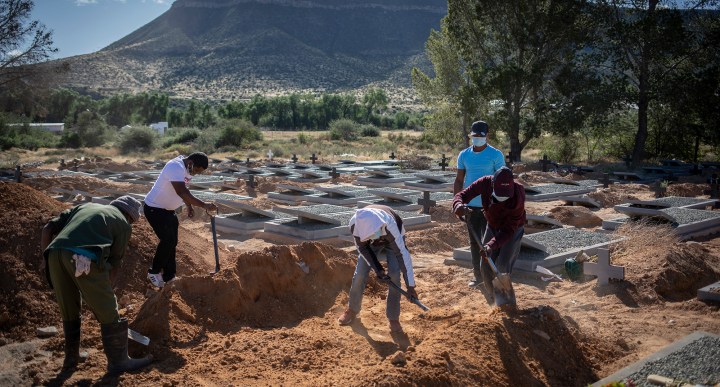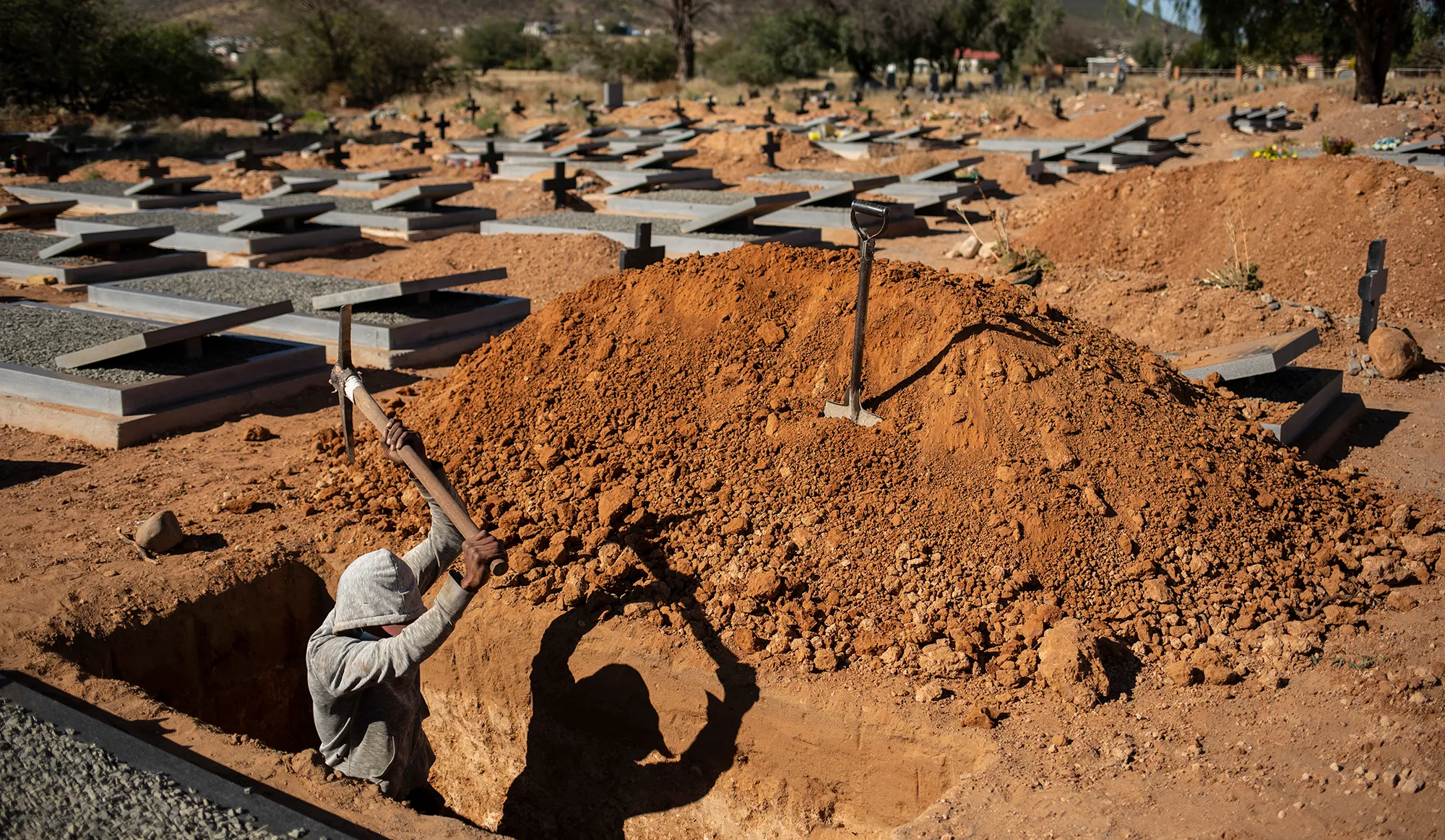LOCKDOWN REPERCUSSIONS OP-ED
Covid death rate in rural Eastern Cape far and away highest in South Africa

One in 10 households in the rural Eastern Cape has experienced at least one Covid death during 2020 and 2021, which aggregated to a death rate of around 660 per 100,000. Government reports now confirm that the Covid death rate in the Eastern Cape was far and away the highest in South Africa.
“More than anything, we saw the hunger on their faces, in their eyes. It was hard to ask questions when you could see that what they really needed was a decent meal.”
This is how fieldworkers from Walter Sisulu University (WSU) described moving around the villages of the former Transkei posing questions about vaccine resistance and hesitancy in March 2022. Their observations have been supported by distressing reports of deepening rural hunger and starvation, especially among children, in many parts of the former homelands.
Yet, in describing rural life today, many spoke equally of their feelings of social isolation and a kind of nakedness in community life, defined by diminished ubuntu, sharing and conviviality. They likened this situation to ukubaze, or nudity, and blamed the State’s draconian lockdown restrictions on family funerals and bans on customary practices, as well as the fear created by so much Covid death.
In our research, we found that one in 10 households in the former rural Transkei has experienced at least one Covid death during 2020 and 2021, which aggregated for the rural Eastern Cape as a whole amounted to a death rate of around 660 per 100,000. Government reports now confirm that the Covid death rate in the Eastern Cape was far and away the highest in South Africa.
Fierce contestation expected for ANC deputy president position
The feelings of desperation were compounded by the fact that the same community residents said that they buried as many family members from urban areas at their rural homes as died in the villages, especially during the second wave when travel restrictions were lifted. They said that during this time funerals were no longer large, weekend-long family events of collective celebration, mourning and consumption. There was much talk of the need to re-enact rituals or complete the bits that could not be undertaken to restore spiritual security to families and clans.
In some places, funerals happened three or four times a week at breakneck speed with poor attendance, scant regard for cultural protocols, and in the presence of police who enforced Covid regulations. As a result of such hurried and poorly supported death, 40% of the respondents believed that the rituals they attended failed to achieve their cultural objectives, such as ensuring a smooth passage for the dead to the afterlife.
One woman explained it this way: “The pandemic has brought so much change in people’s livelihoods in the village… Even now, as we speak, there are two funerals that I am supposed to be attending at a village close to ours, as it is people I know. However, we no longer attend all these events… If it is a person who does not share the same clan name or family, or it is a distant family member, no matter how well we know the person, we no longer attend the funeral or any other ritual ceremonies.”
She insisted that the fear and terror associated with Covid death, and restrictions imposed, had pushed people apart and promoted social isolation.

Members of a local church wait outside their church for a food handout from NGO Gift of the Givers, in Willowmore, South Africa, 12 June 2020. (Photo: EPA-EFE/Kim Ludbrook)
References to ukubaze or nudity in the field invoke the famous work of the Italian philosopher Giorgio Agamben who explored the depreciation of human life that came with a loss of power, sovereignty and citizenship. He related such conditions to what he called the declaration of “states of exception”, situations in which states used their power to effect forms of structural exclusion that rendered the social reproduction of life difficult or impossible.
In this regard, Agamben articulated two key concepts, what he called the “bare life”, where certain categories of citizens were condemned to a life of perpetual poverty, and the more extreme condition of “naked life”, which had genocidal implications, where marginalised or “surplus people”, such as Jews under Nazism, were denied the capacity for biological and social reproduction.
In applying Agamben to South Africa, it is not difficult to see how the old migrant labour system and the creation of the native reserves, later the homelands, by the colonial and apartheid government institutionalised a “bare life” for many rural South Africans. And, how these systems and institutions made social reproduction difficult in the country’s rural periphery.
In post-apartheid times it has been market exclusion, mainly the scarcity of urban jobs and housing, that have perpetuated “bareness” in South Africa and in the rural areas too. In the latter setting, reduced migrant remittances and the failure of government rural development and land reform projects have exacerbated marginality. However, on the other hand, the universal provision of social grants and pensions to the rural poor by the State to all South Africans served as a bulwark against extreme poverty.
Herein lies the paradox of extreme Covid-induced rural hunger. Since, while the State contained cultural practice and thus reduced its cost to rural families, it also increased the grant system to protect vulnerable South Africans from extreme poverty. The Covid-19 Social Relief of Distress grants first introduced in May 2020 have now been paid to over 10 million South Africans, many living in rural areas. Access to these grants was renewed in October 2020 and was recently renewed for a third time in February 2022.
To understand “nakedness” thus requires a wider lens. It requires an appreciation of how culture and livelihoods have remained intimately intertwined in rural areas after apartheid, and function as mechanisms that build social capital and support the socialised distribution of resources. The capacity of custom to perform such functions was already recognised by the settler colonial state and mining capital in the late 19th century when custom was reconstituted under colonialism as a virtuous system to support racial capitalism and suppress rural revolt. As time passed and rural poverty deepened, it became more entrenched as shared poverty was sustained from above and below.
Since the end of apartheid, and despite policies to end migrant labour, the rural-urban connection remains as rural investment increases, driven on the one hand by the precarity of urban life and joblessness and on the other by the pervasive illness and death associated with the HIV and Aids epidemic. Rebuilding and modernising rural family homes and the explosive expansion of the funeral industry with its associated impact on ritual practice have been the most visible features of this trend.
In this context, customary practice served to affirm clan and family identities in troubled times, deepened the flows of people and resources between urban and rural areas — and with it the historically entrenched social economy of shared poverty, now laced with consumerist desires and the quest for suburbanisation in the countryside. Academic research shows that cycles of relative prosperity and employment in cities tend to intensify rural investment and home visitation, while periods of recession or downturn, such as that after the 2008 global recession, tend to subdue circular migration and rural investment.
We are currently in such a cycle, instigated by the crisis of Covid. Earlier this month, I wrote in Daily Maverick of the tendencies among the youth to push for “transactional vaccination” to expand their access to social grants.
But there are other changes that have occurred in response to the cultural crisis too. One notable trend is the reshuffling of the membership of households. Our data shows that 75% of all households in the rural areas have changed shape, with half showing expanded membership. This is partly a product of reverse migration, as urban-based scholars, students, and unemployed youths returned home, but was also a direct response to the weakening of social cohesion within rural communities.

Local grave digger Romio Bardman digs another grave in the town’s graveyard in Graaff Reinet, South Africa, 12 June 2020. (Photo: EPA-EFE/Kim Ludbrook)
Families are pulling together to protect the vulnerable in the absence of wider opportunities for access to the redistribution associated with the rural ritual and social economy. In 2018, the average reported household size in the Eastern Cape was only 3.8 members per unit, with slightly larger families recorded in rural areas than in urban ones. In 2022, we found that the average family size in the rural areas of the former Transkei had increased to over six members per unit, despite the huge loss of life during Covid. The greater availability of youth labour at home and the spread of hunger had also increased the use of household gardens by 25%.
As expected, circular migration from the cities has thinned out to a trickle with 57% of households reporting that fewer of their relatives from the cities are visiting than before. Only 12% of households said that they had seen more of their urban family members visit since the pandemic started. The general dissatisfaction with the State’s management of the pandemic was also reflected in the very low voter turnout in the rural Eastern Cape during the November 2021 local government elections.
As rural families and communities reorganise in the wake of the devastating impact of the pandemic, they fear the long-term consequences of the current “nakedness” of rural life. The youth sing in ironic tones of their new dependence on social grants and the generosity of Cyril Ramaphosa, which does little more than keep them idle. They yearn for decent jobs and wonder about the future and the conditions that would be required to provide them with genuine hope, offering them a “better life” rather than a new version of the “bare life” after colonialism. DM
Prof Leslie Bank is Deputy Executive Director in the Inclusive Economic Development Unit at the HSRC in Cape Town and has been leading a project with WSU on vaccine hesitancy in the rural Eastern Cape. His new book, with Nelly Vuyokazi Sharpley, Covid and Custom in Rural South Africa, has recently been published by Hurst Publishers, London.
The headline was changed on Sunday, 29 May, 2022, to accurately reflect the contents of this article.
[hearken id=”daily-maverick/9472″]




















 Become an Insider
Become an Insider
This is a very elegant description of this situation and a powerful motivator for rebuilding the towns upon which rural people rely. When the smaller towns collapse these rural people suffer unbelievably.
This headline is incorrectly exaggerated and misleading – the article clearly states 1 in 10 households, NOT every household. Not DM’s expected standard.